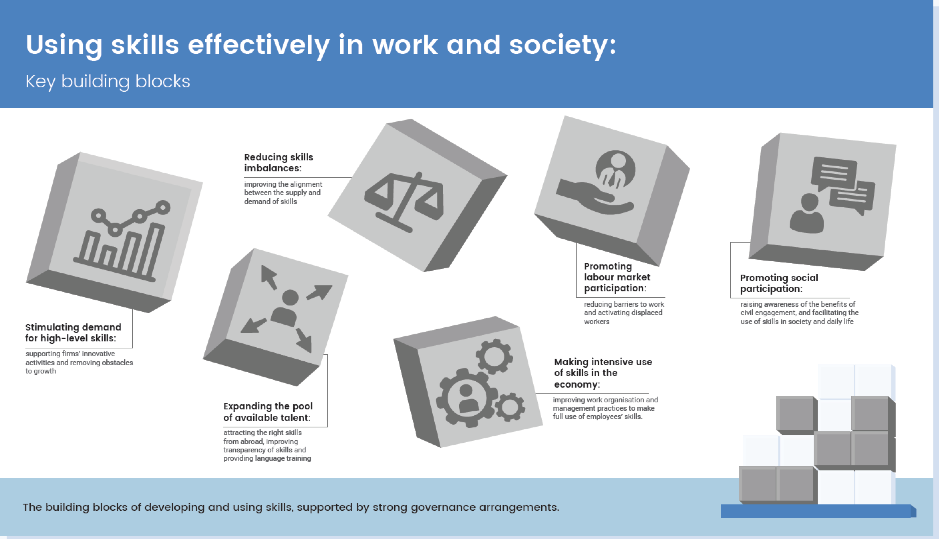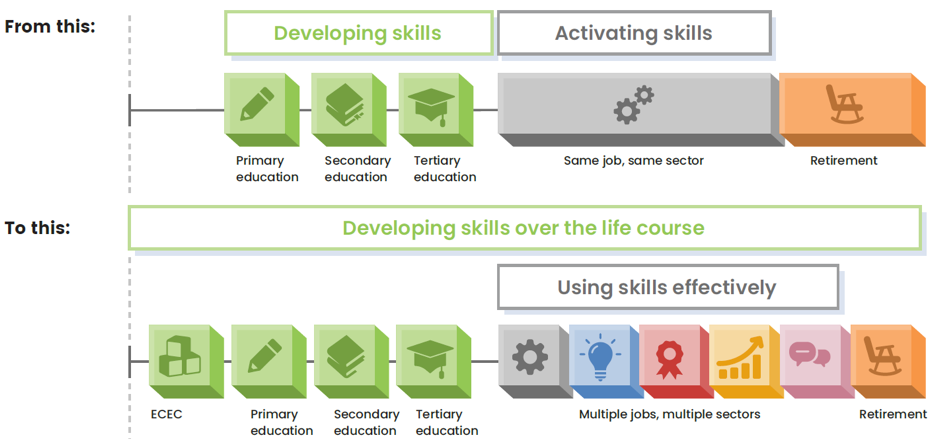
For the future good of the Northern Ireland economy we need to better anticipate change, build resilience and develop a broader set of skills and proficiency. We need to reinvent the way people learn and interact with each-other to get the best out of new technologies and innovative ways of working, so more businesses are productive, and more people can progress and prosper to drive inclusive growth.
We are bombarded with articles and events on how to survive in the age of automation, the future of work, the rise of the robot and AI along with the skills pipeline. “Skills empower economies, business and people to thrive in our increasingly interconnected and rapidly changing world” (OECD Skills Strategy 2019 – Skills to Shape a Better Future). This is undoubtedly true, the question arises then, how as leaders do we take the right approach? How do we develop the right skills and how do we us these skills fully and effectively?
Skills matter for individual wellbeing and national prosperity, as we have seen from recent events the need to have skills flexibility in our economy is growing rapidly. Our education and training systems are based on a linear process leading to a career. This is now proving unable to support the pace of disruptive technology, the changing face of manufacturing and the very definition of work itself. When we look at key megatrends the challenge is clear:
Investment in skills and developing the relevant ones over the life course is now a significant challenge for policy makers, business and individuals. The focus of improving educational outcomes has led to a loss of focus on developing wider skills needed for a very fluid and flexible labour market able to address these significant megatrends.
In Northern Ireland there is rightly a focus on increasing R&D investment. Certain sectors are now finding that having done this that tertiary along with vocational education and training is struggling to tailor its offering (primarily by being starved of resource). This is leading to innovation strategies being curtailed or failing to have impact.
Developing skills over the life course of all in work, rather than reskilling after loss of work is now a key challenge to business in Northern Ireland. The development of social partnership, investment in our management and leadership skills (our IoD NI Academy programme addresses this fully) coupled with investment in our FE Colleges and Universities can enable this. It will be essential that business takes the lead in supporting this change, fully engaging in every opportunity to reform and being the first mover where possible.
Graphics credit - OECD Skills Strategy 2019: Skills to Shape a Better Future
We are bombarded with articles and events on how to survive in the age of automation, the future of work, the rise of the robot and AI along with the skills pipeline. “Skills empower economies, business and people to thrive in our increasingly interconnected and rapidly changing world” (OECD Skills Strategy 2019 – Skills to Shape a Better Future). This is undoubtedly true, the question arises then, how as leaders do we take the right approach? How do we develop the right skills and how do we us these skills fully and effectively?
Skills matter for individual wellbeing and national prosperity, as we have seen from recent events the need to have skills flexibility in our economy is growing rapidly. Our education and training systems are based on a linear process leading to a career. This is now proving unable to support the pace of disruptive technology, the changing face of manufacturing and the very definition of work itself. When we look at key megatrends the challenge is clear:
- Globalisation: we operate in a more integrated economy than ever before, the impact of the US-China trade war is clearly impacting our economy. Emergence of global value chains, the continued look at offshoring and outsourcing is still to be fully understood and tested. This is clearly creating vulnerability for many workers in Northern Ireland, highlighting the challenge of being the region with the highest concentration of those in work with no formal qualifications in the UK.
- Technological Change: technology is developing at an exponential pace, which many businesses / organisations and individuals are struggling to keep up with. This is leading to the emergence of many new forms of work. The expansion of sources of learning is a fantastic opportunity we need to tap into and use positively.
- Demographic Change: The working age population is decreasing, leading to changing five generation workplaces (where only a few years ago we were thinking of four generation workplace challenges) and the need to integrate these to deliver positive business and societal outcomes. From a wider economic perspective this is creating challenges for the care system and how we ensure the next generations have the right skills for the future of work.
Investment in skills and developing the relevant ones over the life course is now a significant challenge for policy makers, business and individuals. The focus of improving educational outcomes has led to a loss of focus on developing wider skills needed for a very fluid and flexible labour market able to address these significant megatrends.
In Northern Ireland there is rightly a focus on increasing R&D investment. Certain sectors are now finding that having done this that tertiary along with vocational education and training is struggling to tailor its offering (primarily by being starved of resource). This is leading to innovation strategies being curtailed or failing to have impact.
Developing skills over the life course of all in work, rather than reskilling after loss of work is now a key challenge to business in Northern Ireland. The development of social partnership, investment in our management and leadership skills (our IoD NI Academy programme addresses this fully) coupled with investment in our FE Colleges and Universities can enable this. It will be essential that business takes the lead in supporting this change, fully engaging in every opportunity to reform and being the first mover where possible.
Graphics credit - OECD Skills Strategy 2019: Skills to Shape a Better Future


 RSS Feed
RSS Feed
